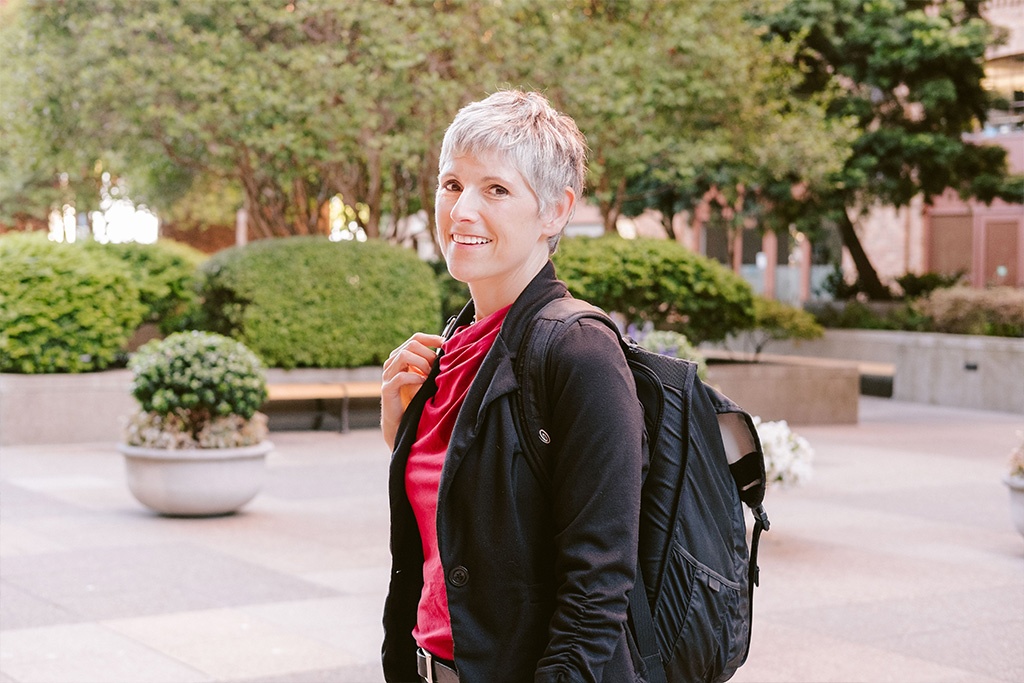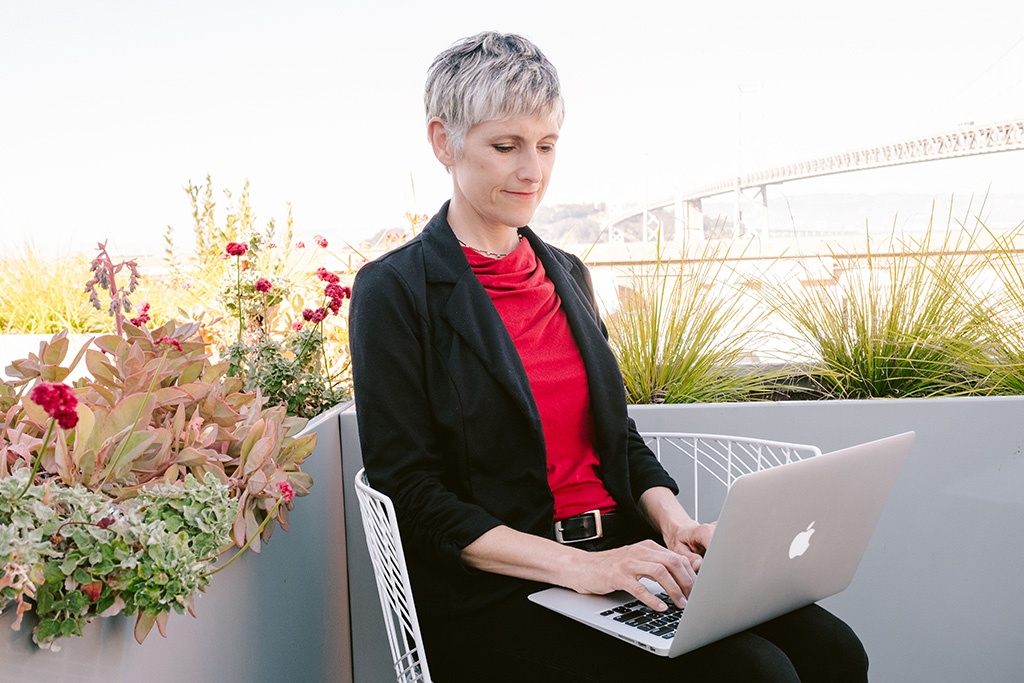Google UX researcher Sara Cambridge
A People Nerds interview with Sara Cambridge
Sara Cambridge has taken a career path that turned into a full circle. She started college as an anthropology major, dropped out to become a designer, returned to study design, only to find out that she wanted to become a researcher who studies people and their cultures.
If you’ve ever seen her UX presentations on best practices for diary studies that she's developed, you understand why she’s gained a reputation as being something of an expert. As a UX researcher, previously at gotoresearch and now at Google, Sara uses her experience in conducting interviews, diary studies, and usability testing to lead research that helps companies better understand their customers' needs.
dscout: Do you consider yourself a “people nerd?”
Sara Cambridge: Yes! I love that term. I loved your interview with Catherine Lovazzano at Fitbit. She talked about having empathy for her stakeholders, and that was really resonant for me.
When I was a kid, my first career goal was to be an anthropologist or archeologist. I remember my mom taking me to an Indian ground where somebody had a dig. You could sift through the garbage mound, and I came home with a bag full of snake bones!
But, I also realized I wanted it to be about people. That’s what’s interesting to me: people, cultures, cultural rules, people nerd stuff.

Can you talk a little about your circuituous career path?
I started college to be an anthropologist. But the anthropology department was in the basement of a really nasty building. I would visit the professors and think, “I don’t want to work here. This is gross.”
I ended up going into graphic design. Some friends had bought a screen-printing company, so I dropped out of college to run the design department and went back to school to study graphic design.
I saw design as making culture, which was related to my original interest in anthropology. Eventually, I went back to school to take classes in web design. I had been doing web work and had started hearing about UX- and user-centered design.
When I was a designer, I was really trained in the world of “you’re the author, you’re the creator.” It was a very one-way street: The designer finds the solution and gives it to the user. Whereas UX is about, “Let’s talk to the user and figure out how they’re thinking about this.” I ended up going to grad school at the School of Information at Berkeley. I wanted a program that had more of a technical focus, because I knew that was really my weak spot. I went in thinking I was going to end up as an interaction designer, but I fell in love with research in my first semester.
My first semester in grad school, I went to a one-day workshop, and I came out of that day like, “I’m going into research.” That’s the way I work; the moment I figure out what I want, then everything else is just gravy.
Having a strong background in design, everybody expected me to stay in design. I had to turn down a lot of jobs and really assert myself: “No. I really want to do research.” Then I got hired to work on a National Science Foundation grant to do research on time banking.

“I can be that voice of the user and be part of those discussions as they’re happening.”
Your design background is useful! Do you ever want more of a hand in the design?
Yes. When I worked at a consultancy, my design background was really, really helpful because it helped me communicate my findings both visually and with storytelling. But I missed having a more direct impact on design. I did all this research, and I didn't know what the clients were doing with it.
Also, in an agency, I realized there was a lot I didn't know about the product, about the scope, and the business constraints. If you don't know their strategy, you're not really going to be able to make the most informed recommendations. I wanted to go in-house.
Is that part of what drew you to Google?
Absolutely, yes. I wanted to go in-house where I could work with the design team. I have no desire to actually be doing the design, just to be around for the conversations. It was also clear to me that I can't put all of the knowledge I have into a report. There's so much data locked in my head. So it’s great to be in a team where they're really hungry for more insights into their users. For the team, I can be that voice of the user and be part of those discussions as they're happening.
Being at a consultancy was great; that’s generally where the highest caliber of work is being done. I knew it would be a great training ground for me.
You're known for being an expert in diary studies. How did you get turned onto those?
At the consultancy, one of my first projects was working on a longitudinal four-month study on how families were using a new digital entertainment service. This is how I got my first exposure to diary studies. The tool we used was dscout.
We ended up doing eight different studies with those participants over four months. It was five families, so it was really small. The first thing everybody did was introduce themselves to us with a 30-second video talking about how they watch TV. We ended up with a total of 15 people who we got to know through the diary study.
When you have just five families, do you feel comfortable you’ve achieved the breadth of what you’re looking for?
The thing about the small sample sizes is that we ensure they're very, very carefully recruited and screened to represent the population and behaviors we want to study. In that case, we were looking for families with very specific TV-watching behaviors.
That's what people often don't realize with those really small sample sizes: if you're really carefully screening, and you know you have the right people, then you're fine. The other piece is that you get so much qualitative data. We spent hours doing contextual, in-person interviews with them, watching TV with them, and we did biweekly remote interviews with our main contact in the family.

It’s like you were part of the family!
You know, a couple of the people really became friends, because we spent a lot of time with them over months. You talk to your friends about how you watch TV, so it felt very social. I was so sold on diary studies after using dscout. One reason is, with dscout diary studies, we were able to show stakeholders the videos and texts from parents in the moments they were having problems with the client's service. Our stakeholders could see how critical the problems were. It was an incredibly effective way to communicate the findings, and not in that "neutral" research tone!
What are some of the challenges or issues to think about when doing a diary study?
We learned the best way to use diary studies was to do the diary study first, and then do a follow-up interview with the best participants. If you do the diary study first, you over-recruit, and you can find out who are the best participants, who has the most interesting data, and just do select interviews with the best participants at the end. Our normal process had been to do interviews out the gate, but we realized that with diary studies, you need to do fewer interviews after you've collected the data.
Another big thing we learned is that it's just so critical to communicate with people throughout the diary study to let them know you're getting their entries. One thing that’s great about diary studies is you can set them up, and let them run. But if I hadn't been keeping track of those entries as they came in and followed up with questions, I might not really have context to understand some of the entries. That was the big thing I learned: I’ve got to keep on top of those entries as they're coming in to get the most out of the data.
The role of the researcher is to have empathy [for] that user’s perspective.
I’d like to circle back to when you said you liked graphic design for "the making of culture." Is there a particular reason you enjoy research with people?
I never know what I'm going to learn. I only know that my initial suspicion -- or my initial hypothesis about how people are going to respond -- is probably going to be way off. This is what I've learned. I love the surprises; I never know.
I also love it because as a researcher, I think I'm a better person. I'm a much better human having been a researcher, because you have to suspend judgment, and that is such good practice. It makes you a better person. The role of the researcher is to have empathy, and take that user's perspective; it is just really good training for being a better human.
Kari Dean McCarthy is a seasoned brand communications strategist, award-winning filmmaker, and gnocchi expert.

Subscribe To People Nerds
A weekly roundup of interviews, pro tips and original research designed for people who are interested in people




